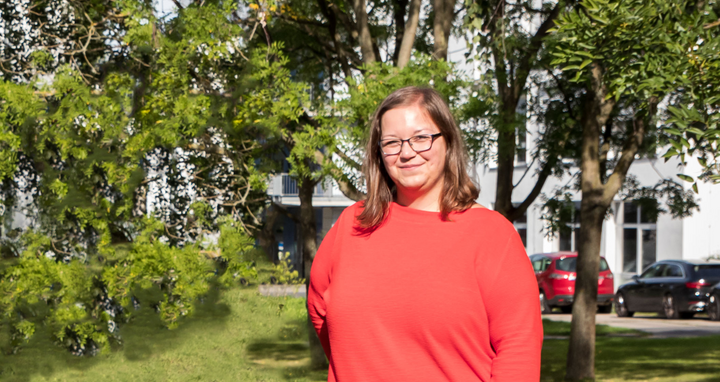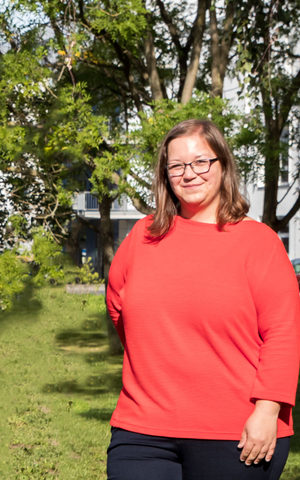Supporting trainees right from the start
Biology laboratory technician, animal caretaker for research and clinical settings, systems integration IT specialist and office management specialist – these are the four vocational training pathways that the Max Delbrück Center is offering. There are also students in the fields of computer science, business informatics and business administration/service management. The work-study program is made possible through the Max Delbrück Center’s cooperation with the Berlin School of Economics and Law.
Around 30 trainees and one dual-study program student in business administration/service management are currently working at the Max Delbrück Center. Christiane Busch is one of nine instructors in the People & Culture department whose role is to support them. A biology laboratory technician by training — she completed her studies at the Max Planck Institute of Molecular Cell Biology and Genetics in Dresden as the best in her cohort — she worked as a lecturer for an educational society in Saxony after choosing not to complete her studies in food chemistry. She taught laboratory courses there and realized that training young people is her passion. Since 2016, she has been living this passion out at the Max Delbrück Center.
In our interview for “We at the MDC,” she talks about her work and what makes training at the Max Delbrück Center special.
Attracting and retaining trainees
What are your responsibilities as an instructor?
Christiane Busch: I am mainly responsible for future office management assistants and their scheduling, i.e., who is supposed to be where, when, and for how long. I also conduct a feedback meeting with the trainee and their supervisor after each training station. Recruiting is a big part of my job. I organize job postings on platforms like azubiyo.de or ausbildung.de, screen applications, answer applicants' questions and invite them to interviews. I am also involved in the job interviews. Bonding with the trainees is also very important.
Bonding – what does that mean?
When applicants sign a training contract with the Max Delbrück Center, it sometimes takes six to nine months before their training begins. To keep the young people from dropping out during this period, we try to maintain contact with them. For example, we invite them and their family and friends to the Long Night of the Sciences. There are also different opportunities for the individual groups. The animal caretakers, for example — those who are already in training and those who will shortly begin — go on a trip together to the Eberswalde Zoo. The new trainees not only get to know their future colleagues, but also gain insight into the work of animal caretakers in zoos — a different occupation than the one they are learning at the Max Delbrück Center, but still very interesting.
Intensive onboarding boosts motivation
When the training starts: How does the Max Delbrück Center welcome the new trainees?
This year, for the first time, we had a whole onboarding week full of programing. After the welcome, there was a campus tour organized by the communications department on the first day. There was also a conversation in English, where the trainees were assessed for their future English courses — these are mandatory at the Max Delbrück Center, as English is spoken in many laboratories and departments. The second day was for all the trainees, not just the newly-arrived ones. It was all about diversity, including the differences between the generations. On day three, there was an IT training session: the IT trainees who have been with us for a longer time instructed the newcomers. On the fourth day, employees from purchasing and logistics presented the SAP system, after which we visited the construction sites on campus together. Finally, on the fifth day we visited the Berlin Institute for Medical Systems Biology of the Max Delbrück Center (MDC-BIMSB) and, among other things, looked at how the zebrafish are kept there.
You take great care of the trainees. How else can you compete for the best young talent today?
The number of applicants is decreasing, but so far, we have had no difficulty filling all the positions. To develop a meaningful commitment to the research center, however, it’s important to grow a sense of community. And that's why we make sure that trainees have chances to meet and get to know each other. It's not that easy during the traineeship years because everyone has a different schedule. That's why we need intensive onboarding. It strengthens the trainee community and boosts everyone’s motivation to stay on track.
Generation Z wants more than work-life balance
Earlier you mentioned the differences between generations. What are they?
Generation Z in particular — those born between 1997 and 2012 — prefers indirect over direct communication. Young people don't like to talk on the phone so much. They’d rather send text or voice messages. So, they respond with a delay. Then, when they are in training and need to react immediately, some have difficulty doing so. They need a little nudge in the right direction.
The older generations sometimes accuse the younger generation of not being very resilient. Is that true?
Absolutely not! Although work-life balance plays a greater role for younger people, that’s a good thing in my view and has nothing to do with a lack of resilience. What has changed is that they critically question the utility and sense of their instructions. Then, they also go on to perform excellently.
The research environment attracts young people
What is special about vocational training at the Max Delbrück Center?
In general, the dual training system in Germany is very practice-oriented. The trainees start working very quickly, and this feeling of being useful is a good experience for them. At the same time, they are above all learners who are allowed to ask questions and make mistakes. What is special and attractive about the Max Delbrück Center is the close proximity to science. The young people who choose us have a great interest in research — they could do their training anywhere in Berlin, but they choose to come to Buch. We’re really pleased about that!
Do trainees ever drop out?
It happens, but fortunately only rarely. Having a personal conversation with the individual is very important to me. So far, it has never been the case that we could have changed anything to retain the trainee — the reasons always lay elsewhere. It’s very unfortunate in every case, as both sides have already invested so much in the training.
What do you think is the best thing about your job?
I enjoy supporting young people from the first to the last day of their training and having the opportunity to observe how they develop here. They are not only trained by us, but also develop as people and personalities during this time. The best moment for me is the day the trainees receive their graduation certificates.
Interview: Jana Ehrhardt-Joswig
Additional information
- Apply to train as a biology laboratory technician (German only)
- Apply to train as an IT specialist (German only)
- Apply to train as an office management assistant (German only)
- What we offer
- “Better is always possible” – Interview with Petra Nibbe, head of the People & Culture department
- “We at the MDC” series





